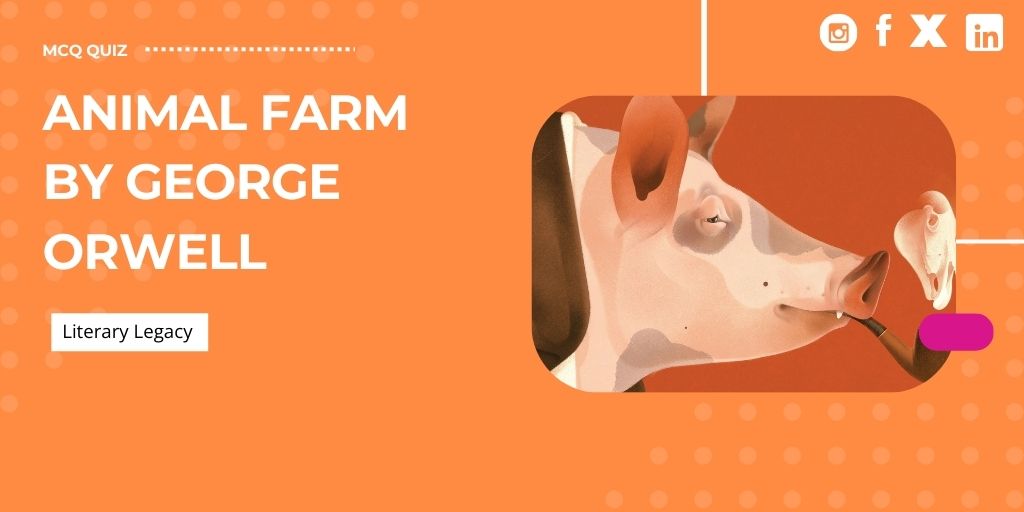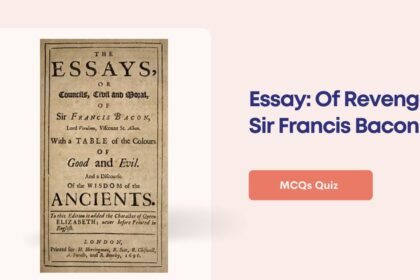1. What is the name of the song that Old Major teaches the animals?
Choices
A) Farmers’ Lament
B) The Song of Freedom
C) Beasts of England
D) The Animal Anthem
Answer: (C)
Beasts of England
The song ‘Beasts of England’ describes Old Major’s vision of a paradise where animals live free from human oppression.
2. What is the main philosophical concept that Old Major’s ideas are turned into?
Choices
A) Animalism
B) Animal Rights Theory
C) Animal Equality
D) Animal Freedom
Answer: (A)
Animalism
The philosophy called Animalism is based on Old Major’s principles for a society of free animals.
3. Who are the three younger pigs that lead the movement after Old Major’s death?
Choices
A) Squealer, Clover, and Boxer
B) Snowball, Napoleon, and Squealer
C) Snowball, Napoleon, and Clucky
D) Napoleon, Squealer, and Boxer
Answer: (B)
Snowball, Napoleon, and Squealer
Snowball, Napoleon, and Squealer are the three pigs that take charge after Old Major passes away.
4. What action do the animals take after defeating Mr. Jones for the first time?
Choices
A) They negotiate a peace treaty.
B) They invite other farms to join them.
C) They capture Mr. Jones.
D) They rename the property to Animal Farm.
Answer: (D)
They rename the property to Animal Farm.
After defeating Mr. Jones, the animals rename their property Animal Farm as a symbol of their new beginning.
5. What was Snowball’s proposal that Napolean opposed?
Choices
A) Creating a windmill for electricity
B) Forming an animal council
C) Building a barn for storage
D) Expanding the farm
Answer: (A)
Creating a windmill for electricity
Snowball proposed building an electricity-generating windmill, which Napoleon opposed until he later supported it.
6. What does Boxer adopt as his personal maxim?
Choices
A) All animals are equal.
B) I will work harder.
C) Unity is strength.
D) Freedom is worth fighting for.
Answer: (B)
I will work harder.
Boxer’s personal motivational phrase is ‘I will work harder,’ reflecting his commitment to the farm’s success.
7. How does Napoleon take control of the farm after expelling Snowball?
Choices
A) By creating new laws
B) By holding a public vote
C) By using intimidation with dogs
D) By forming alliances with other animals
Answer: (C)
By using intimidation with dogs
Napoleon uses intimidation tactics by unleashing the attack dogs to chase Snowball away and consolidate his power.
8. What event is known as the Battle of the Cowshed?
Choices
A) The construction of the windmill
B) The animals’ first harvest
C) The animals’ victory over Mr. Jones to reclaim their farm
D) The initial meeting held by Old Major
Answer: (C)
The animals’ victory over Mr. Jones to reclaim their farm
The Battle of the Cowshed refers to the successful defense of Animal Farm when Mr. Jones attempts to regain control.
9. What happens to the windmill after it is built?
Choices
A) It becomes a symbol of success
B) It is destroyed in battle with humans
C) It is toppled by a storm
D) It is abandoned due to lack of resources
Answer: (C)
It is toppled by a storm
The windmill is found toppled after a storm, reflecting the difficulties the animals face despite their hard work.
10. What is the main conflict between Napoleon and Snowball centered on?
Choices
A) Distribution of food
B) Leadership roles
C) Training the puppies
D) Plans for the farm’s future
Answer: (D)
Plans for the farm’s future
The main conflict arises from differing visions for the future of Animal Farm, represented by Snowball’s windmill plan and Napoleon’s opposition.
11. What justification does Squealer provide for Napoleon’s actions that contradict the original principles of Animalism?
Choices
A) The animals are better off without the principles.
B) The common animals have no right to question leadership.
C) Napoleon acts for the greater good.
D) The principles were outdated and ineffective.
Answer: (C)
Napoleon acts for the greater good.
Squealer convinces the animals that Napoleon is a great leader and that his actions are beneficial for everyone.
12. How does Napoleon ultimately deal with Boxer when he is injured?
Choices
A) He sells him to a glue maker.
B) He nurses him back to health personally.
C) He sends him to a veterinary hospital.
D) He orders the other animals to care for him.
Answer: (A)
He sells him to a glue maker.
Napoleon sells Boxer to a glue maker to obtain money for whisky instead of caring for him.
13. What becomes of the Seven Commandments as time progresses on the farm?
Choices
A) They are rewritten to include new laws.
B) They remain unchanged despite Napoleon’s rule.
C) They are reduced to a single contradictory principle.
D) They are completely abolished.
Answer: (C)
They are reduced to a single contradictory principle.
The Seven Commandments are reduced to ‘all animals are equal, but some animals are more equal than others.’
14. What major event signals a shift in Napoleon’s relationship with human farmers?
Choices
A) The construction of the windmill.
B) The animals’ victory in the pitched battle.
C) The rebellion against Mr. Jones.
D) The trade agreement with Mr. Pilkington.
Answer: (D)
The trade agreement with Mr. Pilkington.
Napoleon entertains Mr. Pilkington, signaling an alliance with human farmers.
15. What is a key theme demonstrated through the pigs referring to themselves as ‘mindworkers’?
Choices
A) The skills required for farm management.
B) The equality of all animals.
C) The harmony between animals and humans.
D) The development of a class hierarchy.
Answer: (D)
The development of a class hierarchy.
The differentiation emphasizes the emerging class hierarchy among the animals.
16. How does George Orwell primarily use language in ‘Animal Farm’ to convey power dynamics?
Choices
A) To show how words can manipulate and control.
B) To create a uniform language across the farm.
C) By illustrating the animals’ lack of communication.
D) By simplifying language for the common animals.
Answer: (A)
To show how words can manipulate and control.
Orwell demonstrates that language is a powerful tool for manipulation and authority.
17. Which statement best describes the condition of the common animals under Napoleon’s regime?
Choices
A) They experience an improvement in their living conditions.
B) They remain cold, hungry, and overworked.
C) They have a stronger sense of community and equality.
D) They enjoy all the fruits of their labor.
Answer: (B)
They remain cold, hungry, and overworked.
Despite Napoleon’s claims, the common animals suffer under his leadership.
18. What action does Napoleon take that signifies the complete transformation of the farm’s identity?
Choices
A) Building a stronger windmill.
B) Organizing a celebration for the animals.
C) Implementing new rules for all animals.
D) Changing the farm’s name back to Manor Farm.
Answer: (D)
Changing the farm’s name back to Manor Farm.
Napoleon restores the name ‘Manor Farm,’ indicating a return to human domination.
19. How does Napoleon’s rule reflect Orwell’s criticism of totalitarianism?
Choices
A) It shows how peaceful solutions can arise from conflict.
B) It demonstrates that all revolutions lead to universal equality.
C) It emphasizes the shared power among all animals.
D) It reveals the corruption that arises from absolute power.
Answer: (D)
It reveals the corruption that arises from absolute power.
Napoleon’s regime illustrates the corruption and manipulation that often accompany totalitarian rule.
20. What is revealed about the nature of revolutions as depicted in ‘Animal Farm’?
Choices
A) They are often supported by external forces.
B) They always achieve their intended outcomes.
C) They lead to inevitable corruption of ideals.
D) They strengthen the bonds between the working class.
Answer: (C)
They lead to inevitable corruption of ideals.
The narrative conveys that revolutions often deviate from their original ideals and can lead to corruption.
21. What vision does Old Major share with the animals during the meeting?
Choices
A) Animals must serve humans for a better life.
B) Animals should live freely without humans oppressing them.
C) Animals can thrive under human control.
D) Animals should form alliances with humans for survival.
Answer: (B)
Animals should live freely without humans oppressing them.
Old Major’s vision is of a paradise where animals live freely together without human oppression.
22. What immediate action do the animals take after renaming the property Animal Farm?
Choices
A) They write laws to govern themselves.
B) They start farming the land with human help.
C) They hold frequent meetings to make decisions.
D) They dedicate themselves to achieving Major’s vision.
Answer: (D)
They dedicate themselves to achieving Major’s vision.
The animals commit themselves to achieving Old Major’s dream after renaming the farm.
23. Which character takes a leadership role after Old Major’s death?
Choices
A) Boxer
B) Snowball
C) Napoleon
D) Squealer
Answer: (C)
Napoleon
Napoleon assumes leadership after expelling Snowball from the farm.
24. What is the response of the animals when Mr. Jones attempts to reclaim his farm?
Choices
A) They surrender to him.
B) They negotiate for better terms.
C) They successfully drive him away.
D) They hold a peaceful protest.
Answer: (C)
They successfully drive him away.
The animals manage to defeat Mr. Jones in a battle to retain control of their farm.
25. How does Napoleon consolidate his power over the other animals?
Choices
A) By educating the animals about Animalism.
B) By including all animals in decision-making.
C) Through democratic elections.
D) By using intimidation and violence.
Answer: (D)
By using intimidation and violence.
Napoleon uses intimidation, particularly through the attack dogs, to consolidate his power.
26. What does Napoleon do to the puppies he takes for education?
Choices
A) He trains them to be attack dogs.
B) He teaches them farming techniques.
C) He allows them to stay with their mothers.
D) He prepares them for leadership roles.
Answer: (A)
He trains them to be attack dogs.
Napoleon takes the puppies to educate them for loyalty and turns them into attack dogs to enforce his rule.
27. What major disagreement arises between Napoleon and Snowball?
Choices
A) The best methods for defense against humans.
B) The allocation of land for farming.
C) How to distribute food among animals.
D) When to begin building the windmill.
Answer: (D)
When to begin building the windmill.
The conflict between Napoleon and Snowball intensifies over the proposal to build the windmill.
28. What happens to the windmill after it is built?
Choices
A) It is destroyed in a storm.
B) It is used to generate electricity for humans.
C) It is improved and expanded by Napoleon.
D) It becomes a symbol of the animals’ freedom.
Answer: (A)
It is destroyed in a storm.
After completion, the windmill is ultimately toppled by a storm.
29. What role does Boxer play in the development of Animal Farm?
Choices
A) He leads the charge against Mr. Jones.
B) He critiques the leadership of the pigs.
C) He commits himself to work harder for the farm’s success.
D) He serves as a symbol of resistance and rebellion.
Answer: (C)
He commits himself to work harder for the farm’s success.
Boxer dedicates himself to the well-being of Animal Farm, embodying hard work and dedication.
30. What effect do Snowball’s and Napoleon’s disagreements have on Animal Farm?
Choices
A) They cause divisions among the animals.
B) They lead to a unified leadership.
C) They create a sense of harmony among the pigs.
D) They benefit the farm’s productivity.
Answer: (A)
They cause divisions among the animals.
The conflicts between Snowball and Napoleon create divisions among the animals, impacting their unity.
31. What action does Napoleon take to eliminate opposition on the farm?
Choices
A) He stages a public trial for each dissenting animal.
B) He allows the animals to express their grievances openly.
C) He hosts a feast for all animals to celebrate unity.
D) He launches a great purge against alleged conspirators.
Answer: (D)
He launches a great purge against alleged conspirators.
Napoleon stages a great purge to eliminate any animals who oppose his rule, claiming they are part of a conspiracy.
32. How does Napoleon justify actions that contradict the principles of Animalism?
Choices
A) By encouraging the other animals to forget the rules.
B) By saying those changes are necessary for survival.
C) By claiming that the principles need to evolve.
D) Through Squealer’s propaganda efforts.
Answer: (D)
Through Squealer’s propaganda efforts.
Squealer, as Napoleon’s propagandist, justifies the abandonment of Animalist principles to convince the animals that they benefit from Napoleon’s leadership.
33. What does the reduction of the Seven Commandments signify on Animal Farm?
Choices
A) The establishment of a new form of government.
B) The growing corruption and betrayal of the revolution.
C) A return to the original ideals of Animalism.
D) A trend towards greater equality among animals.
Answer: (B)
The growing corruption and betrayal of the revolution.
The reduction of the commandments highlights the corruption and betrayal of the initial ideals of equality established during the revolution.
34. What ultimately happens to Boxer after he is injured?
Choices
A) He is buried with honors by the other animals.
B) He is sold to a glue maker by Napoleon.
C) He is taken to a hospital for care.
D) He is rehabilitated and leads a new movement.
Answer: (B)
He is sold to a glue maker by Napoleon.
Napoleon sells Boxer to a glue maker rather than providing him with the care he needs, which demonstrates his betrayal of Boxer.
35. What does Napoleon’s alliance with the human farmers signify?
Choices
A) A complete abandonment of the revolution’s goals.
B) A commitment to the original vision of Animalism.
C) An effort to expand the farm’s territory.
D) A strategy to overthrow Mr. Jones.
Answer: (A)
A complete abandonment of the revolution’s goals.
By allying with human farmers, Napoleon completely abandons the revolutionary ideals that sought to establish independence from human control.
36. What does the phrase ‘all animals are equal, but some animals are more equal than others’ imply?
Choices
A) A new class system has emerged among the animals.
B) Total equality has been achieved on the farm.
C) Only the pigs can enforce the commandments.
D) The revolution was a failure from the beginning.
Answer: (A)
A new class system has emerged among the animals.
This phrase symbolizes the emergence of a class system on the farm, contradicting the original idea of equality.
37. What role does language play in the consolidation of power on Animal Farm?
Choices
A) It encourages dialogue among all animals.
B) It has no significant impact on power dynamics.
C) It is used exclusively for education purposes.
D) It serves as a tool for manipulation through propaganda.
Answer: (D)
It serves as a tool for manipulation through propaganda.
Language becomes a crucial tool for the pigs to manipulate the rest of the animals and consolidate their power.
38. Why do the pigs begin to act more like humans over time?
Choices
A) To experiment with new ways of farming.
B) To reinforce their power and control over the farm.
C) To fulfill their responsibilities to other animals.
D) To better understand their place in the animal hierarchy.
Answer: (B)
To reinforce their power and control over the farm.
The pigs’ behavior mirrors that of humans as they seek to reinforce their power and maintain control over the other animals.
39. What does Mr. Frederick do that underscores the theme of betrayal in Animal Farm?
Choices
A) He initiates a surprise attack and dynamites the windmill.
B) He offers to sell livestock at a fair price.
C) He helps the animals with resources for rebuilding.
D) He forms an alliance with Napoleon against other farms.
Answer: (A)
He initiates a surprise attack and dynamites the windmill.
Mr. Frederick’s attack and destruction of the windmill highlight the theme of betrayal, particularly from those who are supposed to be allies.
40. How does Napoleon’s leadership style evolve throughout the story?
Choices
A) He adopts a dictatorial approach and dismisses dissent.
B) He becomes more democratic and open to suggestions.
C) He encourages cooperation among all animals on the farm.
D) He focuses on improving conditions for all animals.
Answer: (A)
He adopts a dictatorial approach and dismisses dissent.
Napoleon evolves into a dictatorial leader, silencing opposition and consolidating his power at the expense of the other animals.



